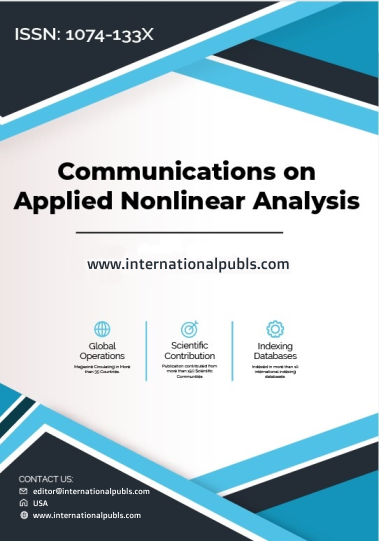
Communications on Applied Nonlinear Analysis
Editorial Geogrphical Distribution: Iraq, USA, UK, Malaysia, Indonesia, China, Yemen, India, Iran, Russia, Brazil, South Africa, Ethiopia, Pakistan, Egypt, Jordon.
e-ISSN: 1074-133X
Frequency: Quarterly (4 Issue Per Year)
Nature: Online
Language of Publication: English
URL: www.internationalpubls.com/index.php/cana
Scope and Focus:
The covers a broad spectrum of mathematical topics, including but not limited to:
- Algebra and Number Theory
- Analysis
- Geometry
- Topology
- Analysis
- Probability and Statistics
- Differential Equations
- Mathematical Physics
- Operations Research
- Combinatorics
- Applied Mathematics
- Mathematical Education
"Communications on Applied Nonlinear Analysis" is a premier journal dedicated to the dissemination of cutting-edge research and insights in the realm of applied nonlinear analysis and mathematics. CANA is your gateway to a world of groundbreaking studies, innovative methodologies, and practical applications within this dynamic field.
Our Esteemed Editorial Team
Our journal boasts a distinguished editorial team comprising leading experts in the field of applied nonlinear analysis. These dedicated professionals bring their wealth of experience, knowledge, and passion to ensure that CANA maintains the highest standards of quality, relevance, and rigor. Our rigorous peer-review process guarantees the integrity and excellence of the articles we publish.
Most Viewed Articles:
- Nonlinear Analysis of Biological Systems: From Cells to Ecosystems
Sadek Habani, Ioannis K. Argyros
- Applications of Nonlinear Analysis in Engineering Design
Oluwatosin T. Mewomo
- Nonlinear Analysis of Heat Transfer in Materials
Abbes Benaissa, X. Zhang
- Nonlinear Dynamics of Complex Systems: Modeling and Analysis
Chibueze C. Okeke
Most Downloaded Articles:
- Chaos and Bifurcation Analysis in Electrical Circuits
Mohammed Derhab
- Nonlinear Analysis of Structural Vibrations
Jeffrey T. Neugebauer
- Nonlinear Analysis of Phase Transitions in Materials Science
Z. Liu
- Algebraic Structures in Cryptography: Challenges and Solutions
Rodica Luca, O. Belhamiti
Why Choose CANA?
-
Impactful Research: CANA is known for publishing research that has a significant impact on the field of applied nonlinear analysis, with articles often cited by researchers worldwide.
-
Peer Review Excellence: We maintain a rigorous peer-review process to ensure the journal's quality and the validity of published content.
-
Global Reach: Our journal enjoys a global readership, fostering international collaboration and knowledge exchange.
-
Open Access: We are committed to the principle of open access, providing free and unrestricted access to our content, promoting widespread knowledge dissemination.
-
Inclusivity: We welcome contributions from researchers at all stages of their careers, promoting diversity in thought and perspective.